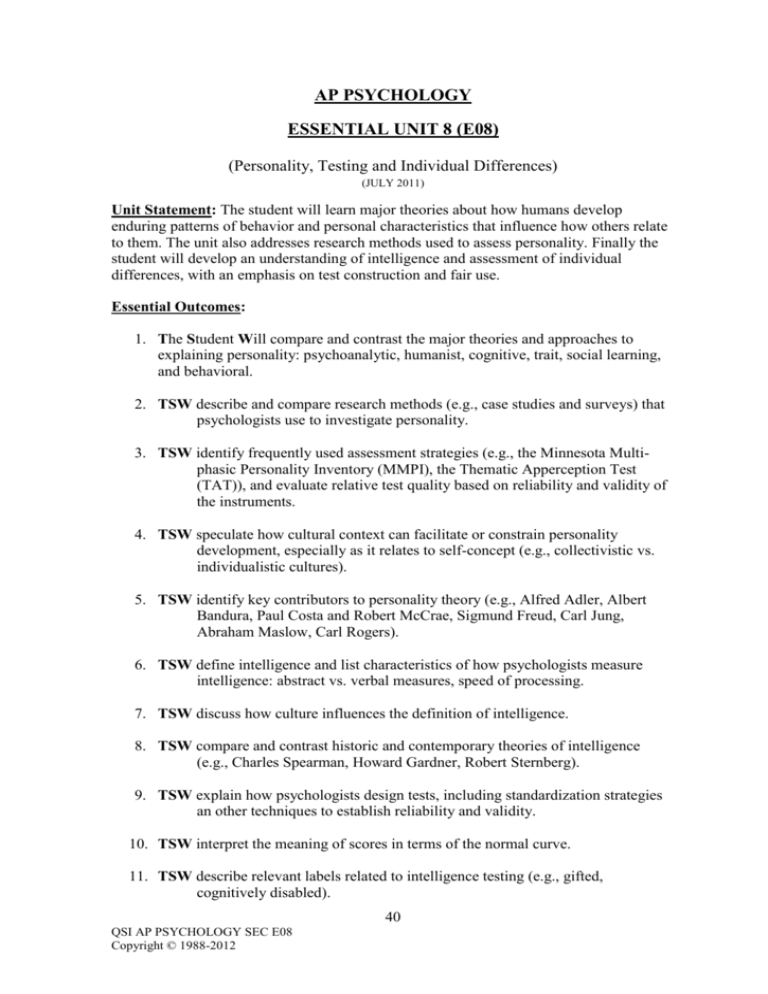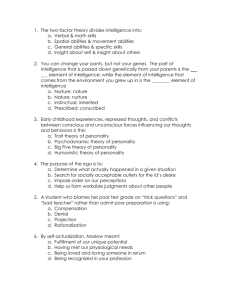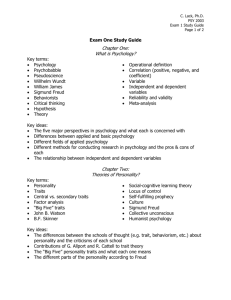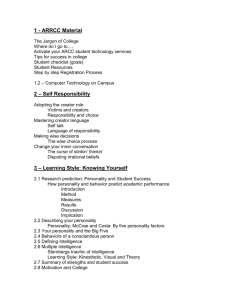AP PSYCH E08
advertisement

AP PSYCHOLOGY ESSENTIAL UNIT 8 (E08) (Personality, Testing and Individual Differences) (JULY 2011) Unit Statement: The student will learn major theories about how humans develop enduring patterns of behavior and personal characteristics that influence how others relate to them. The unit also addresses research methods used to assess personality. Finally the student will develop an understanding of intelligence and assessment of individual differences, with an emphasis on test construction and fair use. Essential Outcomes: 1. The Student Will compare and contrast the major theories and approaches to explaining personality: psychoanalytic, humanist, cognitive, trait, social learning, and behavioral. 2. TSW describe and compare research methods (e.g., case studies and surveys) that psychologists use to investigate personality. 3. TSW identify frequently used assessment strategies (e.g., the Minnesota Multiphasic Personality Inventory (MMPI), the Thematic Apperception Test (TAT)), and evaluate relative test quality based on reliability and validity of the instruments. 4. TSW speculate how cultural context can facilitate or constrain personality development, especially as it relates to self-concept (e.g., collectivistic vs. individualistic cultures). 5. TSW identify key contributors to personality theory (e.g., Alfred Adler, Albert Bandura, Paul Costa and Robert McCrae, Sigmund Freud, Carl Jung, Abraham Maslow, Carl Rogers). 6. TSW define intelligence and list characteristics of how psychologists measure intelligence: abstract vs. verbal measures, speed of processing. 7. TSW discuss how culture influences the definition of intelligence. 8. TSW compare and contrast historic and contemporary theories of intelligence (e.g., Charles Spearman, Howard Gardner, Robert Sternberg). 9. TSW explain how psychologists design tests, including standardization strategies an other techniques to establish reliability and validity. 10. TSW interpret the meaning of scores in terms of the normal curve. 11. TSW describe relevant labels related to intelligence testing (e.g., gifted, cognitively disabled). 40 QSI AP PSYCHOLOGY SEC E08 Copyright © 1988-2012 12. TSW debate the appropriate testing practices, particularly in relation to culture-fair test uses. 13. TSW identify key contributers in intelligence research and testing (e.g., Alfred Binet, Francis Galton, Howard Gardner, Charles Spearman, Robert Sternberg, Louis Terman, David Wechsler). Suggested Materials: 1. King, Laura A. “Chapter 10.” The Science of Psychology: Essentials. New York: McGraw-Hill, 2009. Print. 2. Meyers, David. “Modules 25, 35.” Exploring Psychology in Modules, 7e, E-book Access Card (Activation code for 365-day access). New York: Worth Publishers, 2008. Print. 3. " Psychology Home ." Teacher Professional Development and Teacher Resources by Annenberg Media. N.p., n.d. Web. 31 Oct. 2010. <http://www.learner.org/discoveringpsychology>. Websites: Textbook/Content Related a. King - The Science of Psychology b. Myers 7e in Modules c. HippoCampus Psychology - Homework Help d. Course-notes for Psychology e. Psychology Home f. Encyclopedia of Psychology - Psychology Websites Articles a. Friends With Benefits | Big Questions Online b. How Our Brains Respond to Friends and Strangers | Big Questions Online c. TED Blog | A second opinion on learning disorders: Aditi Shankardass on TED.com d. Can We Change Our Personalities? | Big Questions Online Personality Testing a. Personality test based on Jung and Briggs Myers typology b. The Personality Page c. TypeLogic Home Page d. JediGirl - The Jedi Girl Internet Community e. Are you in the 98% or 2% of the population? f. TESTdex - index of free personality tests and intelligence tests g. The Big Five Personality Test h. YouTube - Stereotypes -- Stossel In The Classroom i. UC Berkeley Psych 150 (Personality) - Full Course - Video j. Human Intelligence: biographical profiles, current controversies, resources for teachers k. The Many Faces of Psychological Research in the 21st Century l. The Effects Of Birth Order On Personality 41 QSI AP PSYCHOLOGY SEC E08 Copyright © 1988-2012 m. How class affects your brain - The Boston Globe n. The Smart Set: The Doctors and the Divine - February 15, 2011 o. "PBS: The Presidents:" EDSITEment's Related Lesson Plans and Websites | EDSITEment Mandatory Assessments: 1. AP style multiple-choice exams must be used. The majority of the questions should require students to use higher order thinking skills such as synthesis and evaluation in which the student must combine knowledge and skills across the unit. 2. Students must be required to complete the Examination Analysis form that is contained as an attachment to the Course Outcomes. Students who have taken the class report the value in helping them properly learn the TSWs. 3. Teacher generated or AP published free-response questions. Free response questions can be taken directly from the AP Central site with rubrics already created to use as an assessment tool. Optional Assessments: 1. Create flash cards for the unit. Students have reported after the AP Exam that they wish this was mandatory. Teachers may want to take this student feedback into account in designing their teaching for this and all other essential units. 2. Students present their approach to a free-response question to the class. This holds students accountable demonstrating the ability to dissect freeresponse questions and for developing an outline to answer the question. The focus is on students’ learning to answer the question asked. 3. There are multiple sites to examine personality --use with caution. The Keirsey Temperament Sorter is fairly good and free at the basic level: http://www.keirsey.com/ To use this in class, explain the categories and have students pair up. Reflecting on themselves and then on their partner, write a few statements about each category. This provides some baseline information (it may also, however, be suggestive in the testing so it is recommended you wait a day or two before using the online test.) It is not recommended that students take online IQ testing as reliability is questionable at best. 4. Using Gardner’s Multiple Intelligences or Goleman’s Social Emotional Intelligence (E.Q.) as a guide, have students conduct a 360º assessment of themselves. Begin with a self-assessment and have them gather a peer, family member, and teacher assessment as well. Have students report on the process and the results. What patterns emerged? Is the 360º method of testing effective? Teacher to Teacher: 1. There is a lot of controversy embedded in this unit. Don’t shy away from it but be careful -- know your topic. For example, the most recent research on intelligence/ability/disability is a paradigm shift. What if we look at textbooks as disabled and the learner as able? Current work at Harvard 42 QSI AP PSYCHOLOGY SEC E08 Copyright © 1988-2012 (www.cast.org) is exploring “Universal Design for Learning” (UDL) and how we should look at variance in ability as the norm, rather than judging ability by a narrow text-based criteria. 2. One way to bring home the issues mentioned in #1 is to examine what it means to be “able” or “smart” in other cultures. You could even invent a culture and demonstrate that ability is a judgement in a context. 3. Remind students that, while personality tests are interesting, informative, and can be fun, there are many impostors and the results of any test are one piece of the aggregate data. Interpretation and a fully dimensional assessment are important elements of any view of personality (or intelligence, for that matter.) 43 QSI AP PSYCHOLOGY SEC E08 Copyright © 1988-2012







